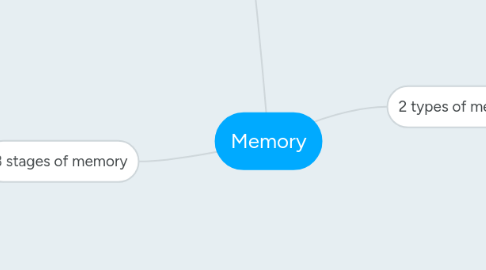
1. 3 stages of memory
1.1. Sensory memory: To keep information for further processing.
1.2. Working memory: used to store information we are currently thinking about. Chunking is the organization of items into familiar or manageable units or chunks. prospective memory is to remember to complete tasks in the future.
1.2.1. Serial position effect: the effect on an items position on a list has on how well it is recalled.
1.2.2. Primacy: the first items in a list receive a great deal of rehearsal, and are thus more likely to be transferred to long term memory.
1.2.3. Recency effect: the concept that people tend to report the last items on a list first while those items are still in their working memory.
1.3. Long term memory
1.3.1. Encoding
1.3.1.1. Shallow processing: focus on physical features rather than its emaning
1.3.1.2. Deep processing: focuses on the meaning of an item and involves forming associations between new and old information.
1.3.1.3. Timing practice
1.3.1.3.1. Massed practice: when an individual try's to learn all in one setting.
1.3.1.3.2. Spaced practice: involves repeated practice of multiple sessions that are spaced out in time.
1.3.1.3.3. Self-referent: people organize material around their own lives and experiences they have access to the cues.
1.3.1.3.4. Distinctiveness: items that are unique or distinct are remembered best, known as the von restorff effect.
1.3.1.3.5. Organization: organizing information helps facilitate memory.
1.3.1.3.6. Testing effect: People who study and then are tested on material, retain that information more effectively over long durations to people who study then study some more.
1.3.1.4. Retrieval is the process of getting information out of a memory storage.
1.3.1.4.1. what you remember after 3 years you will remember for the rest of your life.
1.3.1.4.2. Retroactive interface: When you try to remember an old password but you can only think of your new password.
1.3.1.4.3. Proactive interface: your friend changes his phone number but you keep dialing his old number.
1.3.2. State-dependent memory
1.3.2.1. Memory is best when your mind is the same while your learning and when you are being tested.
1.3.2.2. ex: consuming lots of caffeine while studying would help if you consume lots of caffeine before taking a test.
1.3.2.3. Memory in everyday life
1.3.2.3.1. Memory is not like a video recorder, not every aspect is retrieve.
1.3.2.3.2. what a person remembers depends on past experiences.
2. False memories
2.1. Elizabeth loftus demonstrated that misinformation introduced after an event can alter our recollection of the original event.
2.2. Loftus also demonstrated the "false memory effect" when people can be made to believe events that never happened.
3. 2 types of memory
3.1. Explicit memory (intentional)
3.1.1. Working memory: allows us too store and process limited amounts of information of an immediate sense.
3.1.2. Episodic memory: Long term memory(recalling an event that happened last week).
3.1.3. Semantic Memory: Long term memory that stores general knowledge(knowing simple math).
3.2. Implicit memory(unintentional)
3.2.1. Priming: Unconscious process that can enhance the speed and accuracy of a response as a result of past experiences(seeing red can recognize an apple faster).
3.2.2. Procedural memory: Completing a task after the task after the task is well learned and has become automatic.
3.2.3. Conditioning: A memory for association formed between 2 stimuli(pavlovs dogs).
